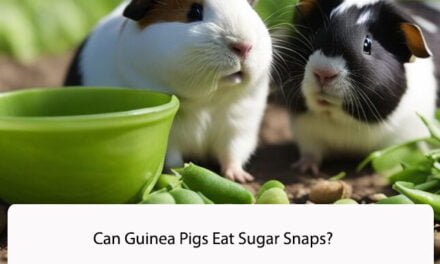Guinea pigs are popular pets that require a balanced diet to maintain their health. As a result, many pet owners wonder if they can feed their guinea pigs human foods, such as saltine crackers. While saltine crackers may seem like a harmless snack, it is important to consider their nutritional value and potential risks before feeding them to your furry friend.
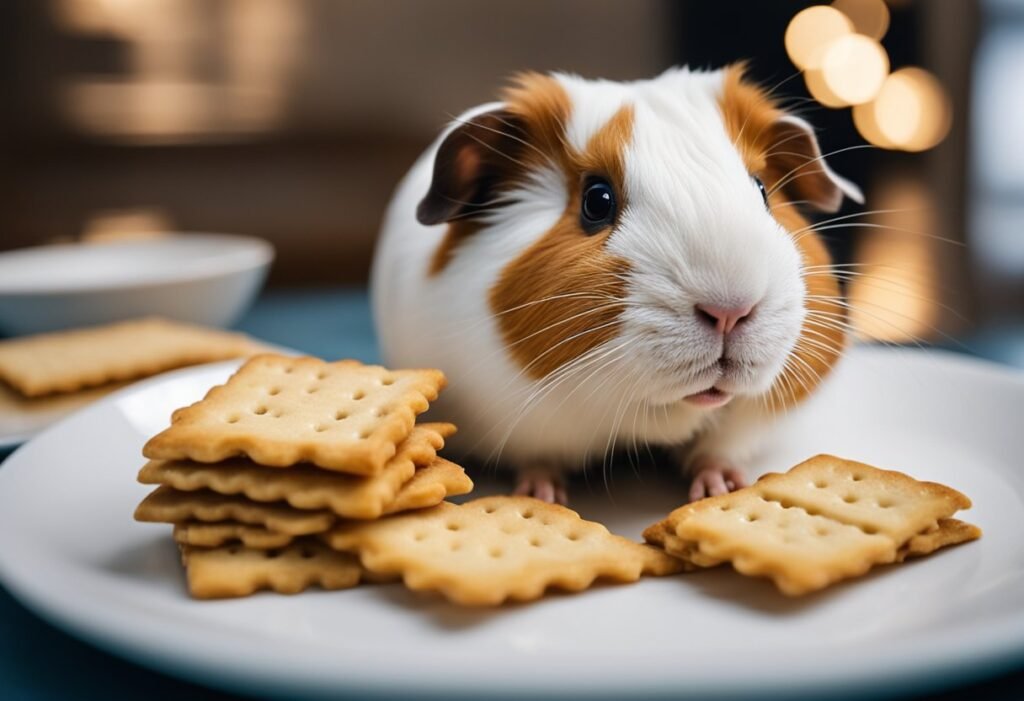
Saltine crackers are a type of cracker made from flour, salt, and baking soda. They are a popular snack in many households and are often used as a bland food to help settle upset stomachs. However, when it comes to feeding saltine crackers to guinea pigs, it is important to note that they are not a natural part of their diet. Guinea pigs require a diet high in fiber, vitamin C, and other essential nutrients, which may not be present in saltine crackers.
Understanding Guinea Pigs’ Dietary Needs
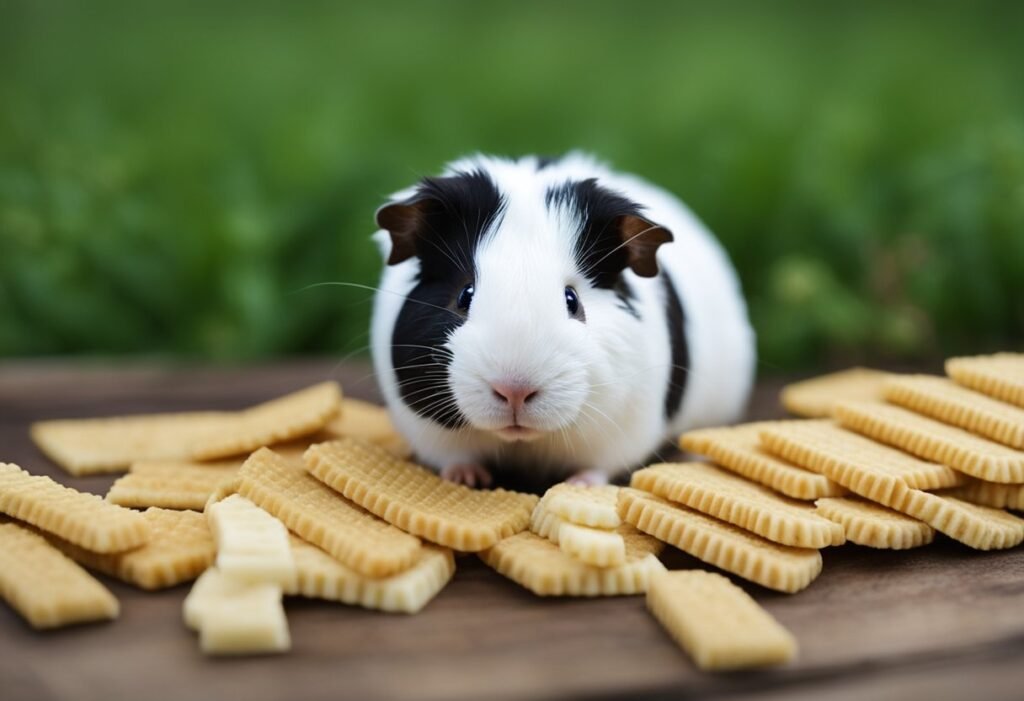
When it comes to feeding guinea pigs, it is important to understand their dietary needs to keep them healthy and happy. Guinea pigs are herbivores, which means they only eat plant-based foods. They require a diet that is high in fiber, vitamin C, and low in fat and sugar.
Guinea pigs cannot produce their own vitamin C, so it is crucial to provide them with a diet that is rich in this nutrient. Fresh fruits and vegetables such as bell peppers, kale, and strawberries are great sources of vitamin C.
It is also important to provide guinea pigs with unlimited access to hay, which is a good source of fiber. Timothy hay, orchard grass, and meadow hay are all great options for guinea pigs.
When it comes to treats, it is best to stick to small amounts of fresh fruits and vegetables. While guinea pigs may enjoy the taste of crackers, such as saltine crackers, these should be avoided as they are high in salt and low in nutritional value.
In summary, guinea pigs require a diet that is high in fiber, vitamin C, and low in fat and sugar. Fresh fruits and vegetables, hay, and limited treats are all important components of a healthy guinea pig diet.
Can Guinea Pigs Eat Saltine Crackers?
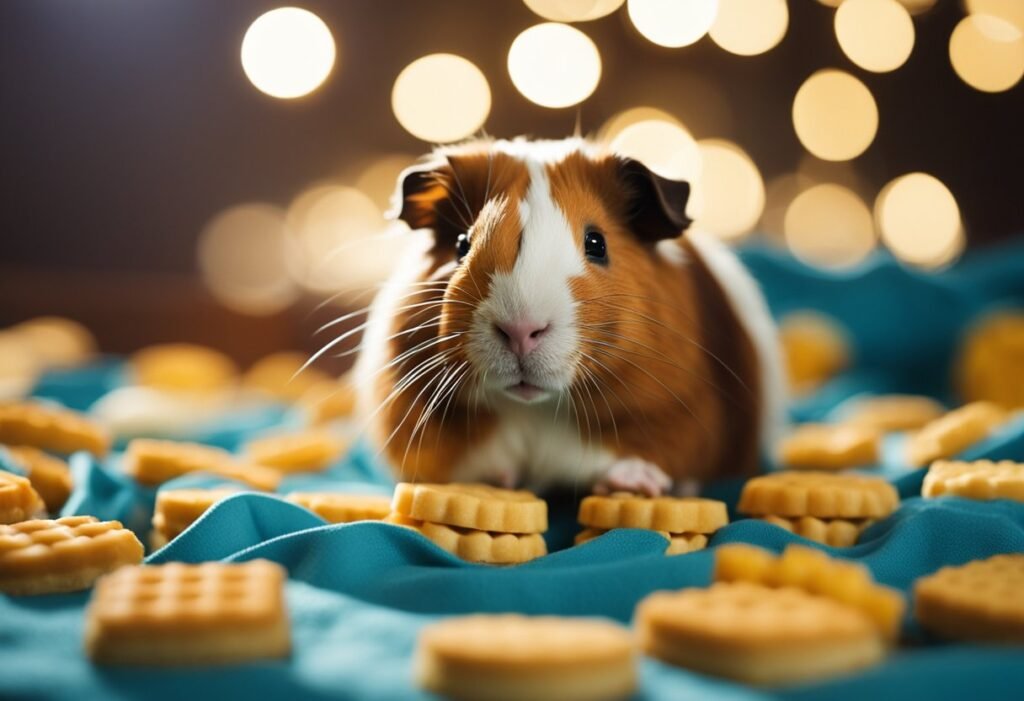
As responsible guinea pig owners, it is important to ensure that our furry friends are getting the right nutrition. Guinea pigs have specific dietary requirements, and it is essential to provide them with a balanced diet that meets their nutritional needs.
One question that often arises is whether guinea pigs can eat saltine crackers. While guinea pigs can eat a variety of fruits and vegetables, it is important to remember that their digestive systems are delicate and sensitive.
Saltine crackers contain a high amount of salt and carbohydrates, which can be harmful to guinea pigs if consumed in large quantities. The high salt content can lead to dehydration and other health issues. Additionally, the high carbohydrate content can cause digestive problems and weight gain in guinea pigs.
Therefore, we do not recommend feeding saltine crackers to guinea pigs. Instead, it is best to stick to a diet that consists of hay, fresh vegetables, and a limited amount of pellets. If you want to give your guinea pig a treat, try offering them a small piece of fruit or vegetable that is safe for them to eat.
In summary, while guinea pigs can eat a variety of fruits and vegetables, saltine crackers should be avoided due to their high salt and carbohydrate content. Stick to a balanced diet that meets their nutritional needs and only offer treats in moderation.
Potential Health Risks of Saltine Crackers
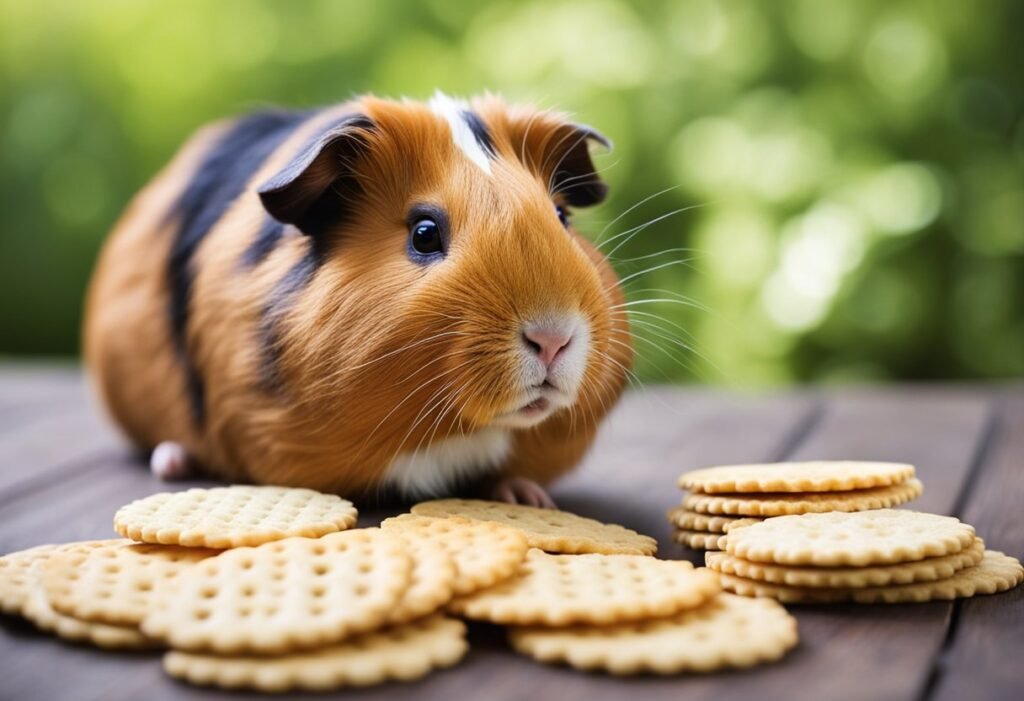
Saltine crackers are a popular snack for humans, but can guinea pigs safely eat them? While saltine crackers are not toxic to guinea pigs, they are not a recommended food item for them. Here are some potential health risks of feeding saltine crackers to your guinea pig:
- High Sodium Content: Saltine crackers are high in sodium, which can be harmful to guinea pigs. A diet high in sodium can lead to dehydration, kidney problems, and other health issues.
- Low Nutritional Value: Saltine crackers are low in nutritional value and do not provide the necessary vitamins and minerals that guinea pigs need to stay healthy.
- Digestive Problems: Saltine crackers are high in carbohydrates and low in fiber, which can cause digestive problems for guinea pigs. This can lead to bloating, gas, and other gastrointestinal issues.
Overall, while saltine crackers are not toxic to guinea pigs, they should not be a regular part of their diet. Instead, guinea pigs should be fed a diet high in hay, fresh vegetables, and a limited amount of pellets. If you have any concerns about your guinea pig’s diet, consult with a veterinarian who specializes in small animals.
Healthy Alternatives to Saltine Crackers

When it comes to feeding our guinea pigs, it’s important to keep in mind that they have specific dietary needs. While saltine crackers may be a tempting treat to share with our furry friends, they are not the healthiest option.
Fortunately, there are plenty of healthy alternatives that can provide your guinea pigs with the nutrients they need. Here are a few options to consider:
- Fresh Vegetables: Guinea pigs love fresh vegetables, and they are a great source of vitamins and minerals. Some good options include carrots, bell peppers, cucumbers, and leafy greens like spinach and kale. Just be sure to introduce new vegetables slowly to avoid upsetting your guinea pig’s stomach.
- Fresh Fruits: Like vegetables, fresh fruits can provide your guinea pig with important nutrients. Some good options include apples, bananas, strawberries, and blueberries. However, fruits should be given in moderation due to their high sugar content.
- Hay: Hay is an essential part of a guinea pig’s diet, as it helps keep their teeth healthy and aids in digestion. Timothy hay is a good option, as it is low in calcium and high in fiber.
- Pellets: Guinea pig pellets are specially formulated to provide your pet with the nutrients they need. Look for pellets that are high in fiber and low in fat.
- Water: It’s important to make sure your guinea pig always has access to fresh water. A water bottle is a good option, as it keeps the water clean and prevents spills.
By offering your guinea pig a variety of healthy foods, you can help ensure that they are getting the nutrients they need to stay happy and healthy. Remember to always introduce new foods slowly and in moderation, and consult with your veterinarian if you have any questions or concerns about your guinea pig’s diet.
How to Feed Your Guinea Pig Properly

When it comes to feeding your guinea pig, it’s important to ensure that they are getting the proper nutrition that they need to stay healthy. Here are a few tips to help you feed your guinea pig properly:
1. Provide a Balanced Diet
A balanced diet for your guinea pig should consist of hay, fresh vegetables, and a small amount of pellets. Hay is important for your guinea pig’s digestive system, and fresh vegetables provide important vitamins and minerals. Pellets should only make up a small part of your guinea pig’s diet, as they can be high in calories and low in nutrients.
2. Offer Fresh Water
Fresh water should always be available for your guinea pig. Make sure to change the water daily, and use a water bottle instead of a bowl to prevent spills and contamination.
3. Avoid Processed Foods
Processed foods, such as saltine crackers, should be avoided. These foods are often high in salt, sugar, and other unhealthy ingredients that can be harmful to your guinea pig’s health.
4. Monitor Your Guinea Pig’s Weight
It’s important to monitor your guinea pig’s weight to ensure that they are not becoming overweight or underweight. If you notice any changes in your guinea pig’s weight, adjust their diet accordingly.
By following these tips, you can help ensure that your guinea pig is getting the proper nutrition that they need to stay healthy.
Conclusion
In conclusion, while guinea pigs can technically eat saltine crackers, it is not recommended as a regular part of their diet. Saltine crackers lack the necessary nutrients that guinea pigs need to thrive, such as Vitamin C, and are high in sodium and carbohydrates.
Feeding your guinea pig a diet that is primarily made up of hay, fresh vegetables, and a small amount of pellets is the best way to ensure that they are getting all the nutrients they need.
If you do choose to give your guinea pig a small piece of saltine cracker as a treat, be sure to limit the amount and frequency to avoid any potential health issues. As always, consult with a veterinarian if you have any concerns about your guinea pig’s diet or health.
Frequently Asked Questions
Are crackers safe for guinea pigs to eat?
While saltine crackers are not toxic to guinea pigs, they are not recommended as a regular part of their diet. Crackers are high in carbohydrates and salt, which can lead to health problems such as obesity and high blood pressure.
What are some alternative treats for guinea pigs?
Guinea pigs can enjoy a variety of fruits and vegetables as treats. Some examples include apples, carrots, and leafy greens like kale and spinach. It’s important to introduce new foods slowly and in small amounts to prevent digestive upset.
Can guinea pigs eat other types of crackers?
It’s best to avoid giving guinea pigs any kind of crackers, as they are not a natural part of their diet. If you want to give your guinea pig a crunchy snack, try offering them a small piece of carrot or celery instead.
Is it okay to give guinea pigs salty foods?
Guinea pigs should not be given salty foods on a regular basis. Too much salt can lead to health problems such as dehydration and high blood pressure. It’s best to stick to foods that are natural and low in salt.
What are some foods that guinea pigs should avoid?
Guinea pigs should avoid foods that are high in sugar, fat, or salt. Some examples include chocolate, processed foods, and sugary snacks. It’s also important to avoid feeding guinea pigs foods that are toxic to them, such as onions and garlic.
How often should guinea pigs be given treats?
Treats should only be given to guinea pigs in moderation. Too many treats can lead to health problems such as obesity and digestive upset. It’s best to limit treats to a few times a week, and to offer them in small amounts.





